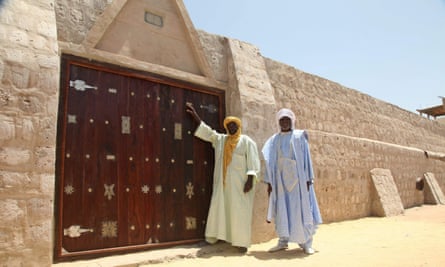A former Islamist militant who was jailed for destroying holy sites in Timbuktu is liable for damages of €2.7m (£2.5m), judges at the international criminal court (ICC) have ruled.
Ahmad al-Faqi al-Mahdi was imprisoned for nine years last year after pleading guilty to war crimes for his involvement in the destruction of 10 mausoleums and religious sites in Timbuktu in 2012.
Jihadis used pickaxes and bulldozers to attack the mausoleums and the centuries-old door of the Sidi Yahya mosque.
The sites were built during Mali’s golden age in the 14th century as a trading hub and centre of Sufism, a branch of Islam seen as idolatrous by some groups.
The assault on a world heritage site triggered global outrage, and Mahdi’s case was the first to come before the Hague-based court as a crime of cultural destruction.
Alina Balta, who works at the International Victimology Institute at Tilburg University, said Mahdi’s custodial sentence sent a strong warning that destroying cultural heritage would not go unpunished, and reparations would help “alleviate the lasting imprints” of the crime.
According to the ICC’s 1998 founding accord, the Rome statute, judges can determine that victims are entitled to reparations including “restitution, compensation and rehabilitation”.
The court can also hand out an order against a convicted person, demanding similar reparations.

However, the type and level of compensation awarded on Thursday will be scrutinised amid doubt over whether substantial funds can be secured, and the time it will take to reach victims.
The security situation in northern Mali posed serious challenges, said the Trust Fund for Victims, an agency that will implement the judges’ order.
It has also pointed to a dilemma – the risk in the future that rumours of hefty compensation could provide an incentive for similar attacks in poor countries with cultural treasures.
The reparations ruling is only the second such award handed down by the court since it began work in 2002.
In March, the ICC awarded symbolic damages of $250 to each of the 297 victims of former Congolese warlord Germain Katanga, who is serving 12 years for an attack on a village in 2003.

The court estimated the damage from the attack to be $3.7m, and found Katanga liable for $1m of that total, but it also acknowledged he was penniless.
Mahdi was a member of Ansar Dine, one of the al-Qaeda-linked jihadi groups that seized territory in northern Mali before being mostly chased out by a French-led military intervention in January 2013.
A former teacher and Islamic scholar, he was leader of the so-called Hisbah (Manners Brigade).Mahdi pleaded guilty to the crime and apologised. He said he had been overtaken by evil spirits and urged Muslims not to follow his example.
The shrines have been restored using traditional methods and local masons, in a project financed by several countries as well as Unesco, the UN agency for education, science and culture.
